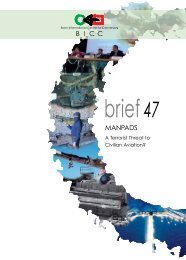egypt-final-presidential-elections-2012
egypt-final-presidential-elections-2012
egypt-final-presidential-elections-2012
Create successful ePaper yourself
Turn your PDF publications into a flip-book with our unique Google optimized e-Paper software.
The Carter Center<br />
Presidential Election in Egypt<br />
damaging to the credibility and impartiality of the<br />
counting process and must be addressed through effective<br />
training.<br />
Inconsistencies in Determining the Validity of<br />
Ballots: The issue of applying uniform criteria to<br />
determine whether a ballot was valid or invalid was<br />
a particular concern, as reported by Carter Center<br />
witnesses. Inconsistencies in determining the validity<br />
of ballots were reported by Carter Center witnesses<br />
in a relatively small but consistent number of polling<br />
stations. In some cases, it was reported that the judges<br />
presiding over the polling<br />
stations appeared to have<br />
varying interpretations<br />
of what constituted an<br />
invalid ballot, including<br />
interpretations that<br />
appeared to deviate from<br />
the law and PEC instructions.<br />
Future training of<br />
judges should focus on<br />
the criteria for determining ballot validity, in order to<br />
minimize instances where a voter’s choice is wrongfully<br />
denied.<br />
Announcement of Results: Results were commonly<br />
announced by the presiding judge to those present<br />
at the polling stations in most of the polling stations<br />
visited. During the first round, in all but one case,<br />
candidate agents were provided with a copy of the<br />
results by the presiding judge, and in the second<br />
round, candidate agents were given a copy in all but<br />
two polling stations. The provision of copies of results<br />
forms to candidate agents is probably the single most<br />
important step supporting the transparency of the<br />
counting process, and thus the failure to provide a<br />
copy to candidate agents is an issue that should be<br />
rectified for all future <strong>elections</strong>.<br />
Transportation of Sensitive Materials: Sensitive<br />
material dispatch to the DGCs was reported as properly<br />
implemented in nearly all cases where Carter<br />
Center witnesses were present. No logistical difficulties<br />
were witnessed. To minimize the risk of fraud still<br />
further, The Carter Center repeats its recommendation<br />
that future EMBs use tamper-evident bags to<br />
transport sensitive electoral materials at all phases of<br />
the process.<br />
Aggregation<br />
Witnesses were denied access to the<br />
national-level aggregation of results.<br />
The Carter Center noted some small improvements<br />
in the aggregation process in the second round of<br />
Egypt’s <strong>presidential</strong> election in comparison to the first<br />
round. The process of aggregating vote results is one<br />
of the most sensitive in an election and demands the<br />
highest levels of transparency<br />
to ensure confidence<br />
in the integrity of the<br />
process. Aggregation of<br />
the count results was<br />
conducted by DGCs<br />
in each of 351 operational<br />
electoral districts<br />
throughout Egypt, where<br />
polling station results were delivered personally by<br />
the relevant presiding judges. After being aggregated<br />
at the district level, results were then transmitted to<br />
the PEC’s Cairo headquarters. The national aggregation<br />
of results is conducted at the PEC headquarters,<br />
which is the only official and authorized source of<br />
<strong>final</strong> results.<br />
The main findings regarding the aggregation<br />
process are summarized below:<br />
Witnesses Access to Aggregation: Witnesses were<br />
denied access to the national-level aggregation of<br />
results. The Carter Center made a request to be able<br />
to have witnesses present at the PEC’s Cairo headquarters<br />
during the aggregation of national results.<br />
The PEC informed the Center that only election<br />
officials can be present during this process. 169 The<br />
169 The PEC explained to The Carter Center in a meeting on June<br />
7, <strong>2012</strong>, that, because Egyptian law did not explicitly authorize the<br />
presence of candidate agents, witnesses, the media, or others during the<br />
<strong>final</strong> tabulation process, none of these stakeholders would be allowed<br />
to be present. (Egyptian law does expressly authorize agent and witness<br />
attendance during polling-station counting and DGC tabulation.)<br />
59



